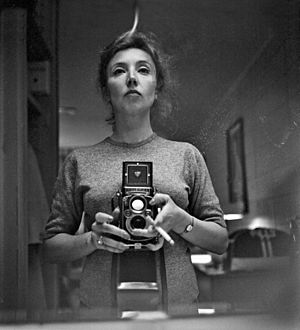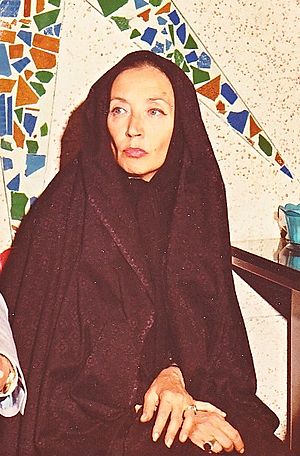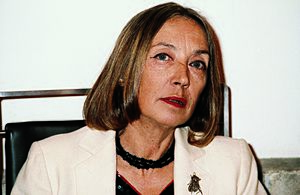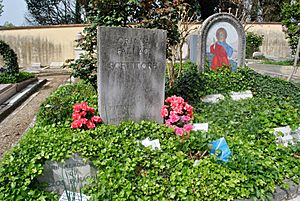Oriana Fallaci facts for kids
Quick facts for kids
Oriana Fallaci
|
|
|---|---|

Fallaci in 1960
|
|
| Born | 29 June 1929 Florence, Kingdom of Italy |
| Died | 15 September 2006 (aged 77) Florence, Italy |
| Resting place | Cimitero degli Allori, Florence |
| Occupation | Journalist, author, interviewer |
Oriana Fallaci (born June 29, 1929 – died September 15, 2006) was a famous Italian journalist and writer. During World War II, she was a partisan, meaning she secretly fought against the bad guys. She had a very long and successful career as a journalist.
Oriana Fallaci became well-known around the world for her reports on wars and big changes in countries. She was also famous for her "long, strong, and revealing interviews" with many important world leaders. These interviews happened in the 1960s, 1970s, and 1980s.
Her book Interview with History includes talks with leaders like Indira Gandhi, Golda Meir, Yasser Arafat, and Henry Kissinger. Kissinger later said it was "the single most disastrous conversation I have ever had with any member of the press." She also interviewed Deng Xiaoping, Ayatollah Khomeini, and Alfred Hitchcock. After she retired, she wrote some books that caused a lot of discussion. These books were critical of Islam, leading to both criticism and support.
Contents
Oriana Fallaci's Early Life
Oriana Fallaci was born in Florence, Italy, on June 29, 1929. Her father, Edoardo Fallaci, was a cabinet maker. He was also a political activist who wanted to end the dictatorship of Benito Mussolini. Mussolini was the leader of the Italian fascist government.
During World War II, Oriana joined the Italian anti-fascist resistance movement. This group was called Giustizia e Libertà. It was part of the larger Resistenza. Later, the Italian army gave her a special award for her bravery.
Her Amazing Career as a Journalist
Starting Her Journalism Journey
After finishing high school, Fallaci briefly studied medicine and chemistry at the University of Florence. She then switched to literature but soon left school. Her uncle, Bruno Fallaci, was also a journalist. He suggested that young Oriana should become a journalist too.
Oriana Fallaci began her journalism career when she was a teenager. In 1946, she became a special reporter for the Italian newspaper Il mattino dell'Italia centrale. Starting in 1967, she worked as a war correspondent. She reported from places like Vietnam, the Indo-Pakistani War, the Middle East, and South America.
Reporting from Around the World
For many years, Fallaci was a special reporter for the political magazine L'Europeo. She also wrote for other important newspapers and the magazine Epoca. In 1968, she was in Mexico City during a protest called the Tlatelolco massacre. During this event, she was hurt by Mexican soldiers. Her detailed report became important proof that a massacre had happened. This helped to show that the Mexican government's denials were not true.
In the 1960s, she started doing interviews. First, she interviewed people from the world of books and movies. These interviews were published in a book in 1963. Later, she interviewed world leaders. These were published in her 1973 book Intervista con la storia. Because of these interviews, some people called her "the most famous – and feared – interviewer in the world" during the 1970s and 80s.
Famous Interviews of the 1970s
In the early 1970s, Fallaci had a relationship with Alexandros Panagoulis. He was one of the people she interviewed. Panagoulis was a brave Greek resistance fighter against the 1967 dictatorship. He had been captured, badly tortured, and put in prison. Panagoulis died in 1976 in a car accident. Fallaci believed he was killed by people from the old Greek military government. Her book Un Uomo (A Man) was inspired by his life story.
During her 1972 interview with Henry Kissinger, he said that the Vietnam War was a "useless war." Kissinger later said this was "the single most disastrous conversation I have ever had with any member of the press." In 1973, she interviewed Mohammad Reza Pahlavi, the Shah of Iran. She later said he saw women as "graceful ornaments" who couldn't think like men. However, he still tried to give them equal rights.
Interviews in the 1980s
In 1980, Fallaci interviewed Deng Xiaoping, a leader in China. One expert called this interview the "most revealing ever of any Chinese leader by any western journalist." Deng spoke very openly about Mao, which was unusual for a Chinese leader. Most other interviews with Chinese leaders were not as interesting.
Later Years and Writings
Oriana Fallaci lived in New York City and also had a house in Tuscany, Italy. She gave talks at famous universities like the University of Chicago, Yale University, Harvard University, and Columbia University.
After the September 11, 2001, attacks in the United States, Fallaci wrote three books. These books were critical of Islamic extremists and Islam in general. In her writings and interviews, she warned that Europe was "too tolerant of Muslims." Her first book was The Rage and the Pride. In this book, she expressed strong views about Islam.
She wrote that "sons of Allah breed like rats." In a 2005 interview, she said that Europe was no longer Europe but "Eurabia." The Rage and the Pride and The Force of Reason both became very popular books. The first one sold over one million copies in Italy. Her third book, "The Apocalypse," also sold about two million copies worldwide. All three books together sold four million copies in Italy.
Her writings have been translated into 21 different languages. These include English, Spanish, French, German, and many others.
Personal Life and Death
On August 27, 2005, Oriana Fallaci had a private meeting with Pope Benedict XVI. This happened at Castel Gandolfo. Even though Fallaci was an atheist (someone who does not believe in God), she had great respect for the Pope. She admired an essay he wrote in 2004. In one of her books, she even called herself a "Christian atheist."
Fallaci was a strong critic of Islam, especially after the Iranian Revolution and the 9/11 attacks. When there were rumors about building an Islamic center in the city of Siena, Fallaci told The New Yorker that she would try to stop it.
Oriana Fallaci died on September 15, 2006, in her hometown of Florence. She passed away from cancer. She was buried in the Cimitero Evangelico degli Allori in Florence. Her family members are buried there too. There is also a stone memorial for Alexandros Panagoulis, her companion who passed away earlier.
Her Legacy and Awards
As of 2018, some streets and squares in Italian cities have been named after Oriana Fallaci. These cities include Pisa, Arezzo, and Genoa. A public garden in Sesto San Giovanni, near Milan, has also been named in her honor.
In July 2019, the Italian Parliament discussed creating new money bills. One idea was for the 20 euro bill to have a picture of Fallaci on it.
Oriana Fallaci received many awards for her work. She won the St. Vincent Prize for journalism twice (in 1967 and 1971). She also received the Bancarella Prize in 1970 for her book Nothing, and So Be It. Other awards include the Viareggio Prize and the Prix Antibes. She also received an honorary degree from Columbia College in Chicago.
On November 30, 2005, Fallaci received the Annie Taylor Award for courage in New York City. She was honored for her "heroism and values." She was seen as "a symbol of the fight against Islamic fascism and a knight of the freedom of humankind." This award is given to people who show great courage in difficult and dangerous situations. The founder of the center that gave the award called Fallaci "a General in the fight for freedom."
On December 8, 2005, Fallaci received the Ambrogino d'oro (Golden Ambrogino). This is the highest award given by the city of Milan. She also received the Jan Karski Eagle Award.
On December 14, 2005, the President of Italy, Carlo Azeglio Ciampi, gave Fallaci a gold medal. This was for her important contributions to culture. She was too ill to attend the ceremony. In a speech she wrote, she said the medal was important to her because it recognized her work as a writer and journalist. She also mentioned her efforts to defend her culture, her country, and freedom.
On February 12, 2006, the President of Tuscany gave Fallaci a gold medal from the Council of Tuscany. During the award ceremony, Fallaci talked about her attempt to draw a cartoon of Muhammad. This was in response to a debate about similar cartoons in other European newspapers.
She also received the America Award from the Italy–USA Foundation in 2010, after her death.
See also
 In Spanish: Oriana Fallaci para niños
In Spanish: Oriana Fallaci para niños
- Robert Spencer
- Steven Emerson
- Daniel Pipes
- Bat Ye'or
- Alexandre del Valle
- Tiziano Terzani
 | Valerie Thomas |
 | Frederick McKinley Jones |
 | George Edward Alcorn Jr. |
 | Thomas Mensah |




